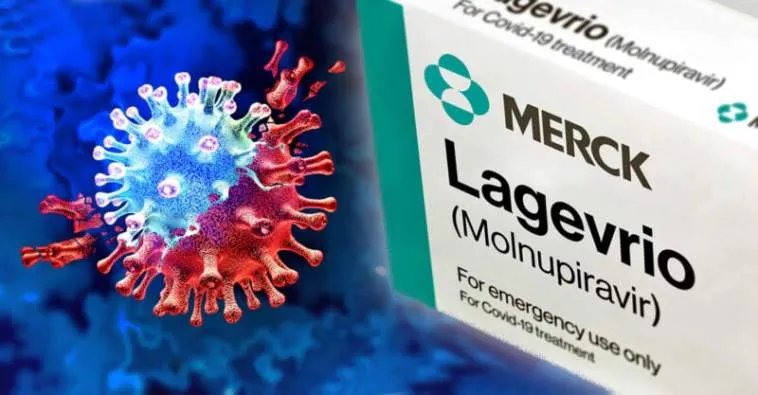(The Defender) Merck’s COVID-19 pill causes viral mutations that can lead to new variants, according to a peer-reviewed paper published Monday in Nature.
“Molnupiravir, an antiviral medication that has been widely used against SARS-CoV-2, acts by inducing mutations in the virus genome during replication,” wrote the study’s authors.
This capability could make it more difficult to predict how the virus will change and spread, according to the authors, who warned that patients who do not clear the virus after a few days could spread its mutated form to others.
Dr. Harvey Risch, professor emeritus of epidemiology and senior research scientist at the Yale School of Public Health, told The Defender the study was “very high-quality research” and that the results are “another ‘duh’ moment.”
Risch said:
“A number of us, myself included, predicted from its mechanism of action that this would be the result when molnupiravir was approved and rolled out. Hence the ‘duh’ — it was obvious. Obvious to everyone except the FDA [U.S. Food and Drug Administration] that is locked into pharma corruption.”
U.S., U.K. and South African researchers analyzed 15 million COVID-19 genomes, finding that the new variants emerged in 2022 after the drug was introduced to many countries, CNBC reported. Many of the novel sequences were the same as those found in patients receiving the antiviral.
The researchers identified high rates of a specific mutation associated with molnupiravir in countries such as Australia, where retirement homes stocked up on the drug.
Most of the mutations linked to the drug have not been shown to be more serious or transmissible, however. The authors said most mutations weaken the virus by interfering with its self-replication ability.
Responding to the study, Merck said the authors relied on “circumstantial associations” between observed variants and the drug rollout, and that the patients analyzed lacked “documented evidence of transmission,” according to CNBC. Merck claimed the mutations were “uncommon” and only associated with “sporadic cases.”
The study comes as concern over COVID-19 cases is again on the rise. But demand for Merck’s drug is down more than 83% for the quarter compared to last year when third-quarter salesreached more than $1 billion.
This was not the first time scientists determined the drug could cause the proliferation of variants.
Concerns about possible ‘vicious positive feedback loop’ predate FDA approval
Sold under the brand name Lagevrio, molnupiravir is an oral antiviral medication created by Merck and Ridgeback Biotherapeutics. It was first approved in the U.K. on Nov. 4, 2021, for treatment of mild-to-moderate COVID-19 in adults who had at least one risk factor for developing severe illness.
In December 2021, the FDA approved the medication for high-risk adults under Emergency Use Authorization. However, it passed the FDA’s Antimicrobial Drugs Advisory Committee vote only by a narrow 13-10 margin due to concerns about its efficacy and its potential to create new variants that might evade immunity and prolong the pandemic.
Dr. James Hildreth, CEO of Meharry Medical College in Nashville, Tennessee, told the FDA panel:
“Even if the probability is very low, 1 in 10,000 or 100,000, that this drug would induce an escape mutant from which the vaccines we have do not cover, that could be catastrophic for the whole world actually.”
Risch told Fox News in December 2021 that molnupiravir “could create viral mutant strains all across the world. It’s a dangerous medication.”
The Indian Council of Medical Research blocked the drug’s use due to concerns over safety and mutagenicity.
Both the FDA and Merck recommended against using the drug in children and pregnant women, as it was lethal to embryos in pregnant rats, and caused birth defects and reduced fetal body weight.
Molnupiravir is not authorized for patients under 18, either, due to its effect on bone and cartilage growth.
According to a December 2021 Washington Post article, Merck’s own research showed that for those taking the pill, the virus could still be detected on the third day of treatment, meaning the patient would still be a “breeding ground for viable mutated viruses” that would present a “clear opportunity for mutant viruses to be transmitted to family members or caregivers.”
The Post expressed concern about the worst-case scenario:
“As long as it is in use somewhere in the world, it could generate repeated cycles of new variants, with people desperately taking the drug to fight the new variants it spawns, creating a vicious positive feedback loop while causing more suffering and deaths.”
William Haseltine, Ph.D., a former Harvard University virologist known for his work on HIV/AIDS and author of “Variants! The Shape-Shifting Challenge of COVID-19,” warned about “supercharging new viral variants” before the FDA approved molnupiravir, but he was largely ignored.
Haseltine wrote in Forbes:
“Molnupiravir works as an antiviral by tricking the virus into using the drug for replication, then inserting errors into the virus’ genetic code once replication is underway. When enough copying errors occur, the virus is essentially killed off, unable to replicate any further. …
“However, outside of the lab, as the drug is given to millions of people with active infections, this disadvantage [to viral replication] may quickly disappear as we would likely provide a prime selection environment to improve the fitness of the virus.”
The authors of the Nature study, from organizations like the Francis Crick Institute and the Imperial College London, published a preprint study in January, identifying the genetic signatures for the types of mutations caused by molnupiravir.
Merck disputed the study, telling Bloomberg, “There is no evidence to indicate that any antiviral agent has contributed to the emergence of circulating variants.”
Harvard medical school virologist Dr. Jonathan Li told Bloomberg the pill’s mutational ability had always been an underlying though hypothetical concern,” saying the January paper “validate[d] a lot of those concerns.






